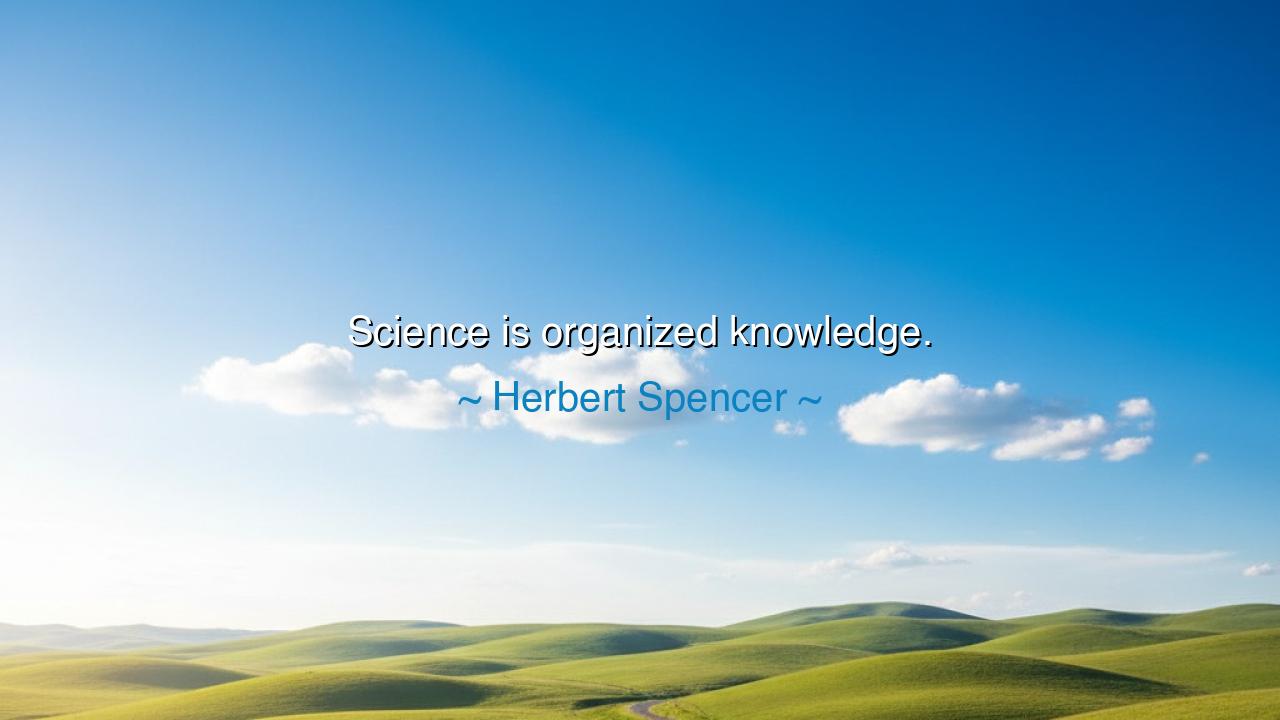
Science is organized knowledge.






The words of Herbert Spencer stand tall like pillars carved into the stone of wisdom: “Science is organized knowledge.” At first glance, these words seem plain, yet in truth they carry a power vast enough to describe the very order of the universe. For knowledge by itself is like a scattered field of stars, beautiful yet chaotic, shining yet disconnected. Science is the hand that gathers these stars, arranging them into constellations so that human beings may find direction. To know many things is one matter; but to organize knowledge is to weave them together, to discover patterns, to draw from them the laws by which the heavens and the earth move.
In every age, the wise have known that information without order is little more than noise. A child may memorize facts like a parrot, yet remain blind to their meaning. But the one who sees how these facts relate—who threads them together into harmony—becomes a master of understanding. This is what Spencer declared: that science is not merely facts, nor mere observation, but the structure, the order, the discipline by which humanity turns scattered truths into enduring wisdom.
Consider the example of Isaac Newton, who sat beneath an apple tree and saw not only the fall of fruit, but the fall of the moon itself. Others before him had observed falling objects, measured their speed, written of the stars. Yet Newton organized knowledge, joining the earthly and the heavenly into one law: gravity. What had been fragments became unity, and through that unity, the world was transformed. This is the power of organized knowledge—to take what is ordinary and reveal within it the extraordinary.
Think also of the voyages of the ancient navigators. Long before compasses or maps, sailors watched the stars, the winds, the currents. Many could recite the names of stars or predict a tide, but it was only when such knowledge was organized—when constellations became maps and patterns became charts—that humanity was able to sail boldly across uncharted seas. Skill and courage carried the ships, but it was the science of navigation that carried civilizations forward.
And yet, let us be warned: knowledge without order leads to confusion, and order without wisdom can lead to destruction. We live in an age where facts multiply endlessly, faster than any one mind can contain. If we do not organize knowledge with care, it becomes a flood that drowns rather than nourishes. Thus the call of Spencer is urgent even now: we must sift, structure, and understand, or else be buried under the very weight of what we know.
The lesson for us is clear: do not be content with gathering pieces of knowledge like shells upon a shore. Instead, ask how they fit together, what greater truth they reveal. To students, this means seeking connections, not merely memorization. To teachers, it means guiding learners to see principles, not just facts. To all who walk the path of life, it means cultivating the habit of organizing knowledge, of drawing meaning from what is learned, and using that meaning to act with wisdom.
Practical steps are within reach. When you learn, do not simply write notes—summarize, connect, and reflect. When you face a problem, gather the facts, but also ask: how do they fit together? What principle governs them? When you teach, do not merely give answers—show the pattern by which answers are born. In this way, knowledge becomes not just accumulation but transformation, not just memory but mastery.
So let the words echo in your heart: “Science is organized knowledge.” For in them lies a call not only to observe, but to structure; not only to know, but to understand. This is the path that turns confusion into clarity, facts into truth, and human beings into seekers who can not only survive, but flourish beneath the vast order of the cosmos.






AAdministratorAdministrator
Welcome, honored guests. Please leave a comment, we will respond soon